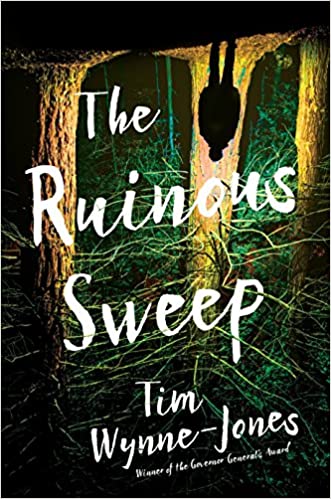The Ruinous Sweep by Tim Wynne-Jones
Tim Wynne-Jones is an author with projects spanning across a diverse array of entertainment, from writing songs for the children’s program Fraggle Rock to writing mind boggling thrillers for adults and young adults. The Ruinous Sweep is a twisting tale split between two perspectives and two worlds. The protagonist Donovan is stuck in a world resembling purgatory with little memory while his girlfriend Bee tries to find answers in reality. When Donovan is charged as a primary suspect for his father’s murder, readers must follow the fragmented path of Donovan’s memories and Bee’s dedicated detective work to find out the truth behind the hazy blur of one fateful night.
Though Wynne-Jones is accustomed to working on various forms of entertainment, he shows a mastery for writing thrillers akin to those dedicated singularly to this path. The plot of The Ruinous Sweep has strong allusions to Alighieri Dante’s Divine Comedy, but is impossible to predict. Readers of mysteries who want to remain guessing until the very end will find contentment in the pages of Wynne-Jones’s constantly shifting novel. We sat down with Wynne-Jones to understand how he transitions to writing thrillers and his creative process in mapping out this suspenseful story.
Rebecca Proulx: You are a successful author of thrillers for adults and young adults, but you also are big in the scene of children’s entertainment. How do you shift gears from, say, composing songs for Fraggle Rock to writing a gripping story of murder and suspense?
Tim Wynne-Jones: Ah, Fraggle Rock! Certainly one of the highlights of my life, getting to work with the legendary Jim Henson. It was a juggling act, to be sure. There was essentially a week between seeing a script for the first time and going into the recording studio, so the songs got written pronto and everything else I was doing got shoved to the side. I can’t really multitask, so when I’ve had other performance-type gigs, I’ve just had to map out my time very carefully. The bottom line is that I can’t write in fits and starts. I need to know I’ve got at least a few solidly free days ahead of me in order to dive in to a novel I’m working on — at least in the initial stages, when focus is paramount.
RP: How does The Ruinous Sweep compare to your past thrillers Blink & Caution and The Uninvited?
TWJ: It’s darker and more mysterious and not entirely rooted in the real world. But then that expression, “the real world” — what’s that about? The Ruinous Sweep is not a fantasy, but it does enter into another world — the scary world of transition, and I think we all know a little about what it’s like when your life gets turned upside down. The stakes are high, and there’s at least one surprise you won’t see coming. What I really love about the new book, however, is that it’s got a detective in it; one of the two heroes, Bee, is determined to solve the murder, putting herself in great peril to do so. And as the pieces all finally fall into place, she finds herself in the very worst place she should be.
RP: The Ruinous Sweep starts in the middle of the action, and the reader is as clueless as Donovan as to how he ended up hitchhiking with a disconcertingly friendly stranger and a deficient memory. How does this opening scene set the tone for the rest of the story?
TWJ: I always want to start a story in medias res — in the middle of things — but some stories are more in the middle than others, and that’s certainly true of this one. I want the reader to be as perplexed as Donovan and to come to their senses bit by bit. The story leaps back and forth between the intensely real world — and what could be more intensely real than an intensive care unit? — and the shadowy random universe in which Donovan Turner finds himself. I want his eerie story to leak into the world in which Bee stands guard, waiting and hoping, so that the whole piece is suffused with dark matter.
RP: The Ruinous Sweep uses an in-between state of reality and fantasy, drawing parallels to Dante’s Divine Comedy. The resemblances are definitely present, but readers are not knocked over the head with them. How heavily did this work inspire you to write your novel, and what do you want readers to take away from these parallels?
TWJ: At some point early in the writing, I realized that Donovan’s journey was taking him into territory that was familiar to me as that of Dante’s famous trip into Purgatory. I went back to that fourteenth-century epic poem and read through the first few cantos, getting some ideas as to what he might expect to happen along the way. But pretty quickly I realized that there was only going to be so much terrain covered before Donovan and Dante parted ways. That said, the overall mysteriousness of circumstances got a real boost from the classic. I certainly was glad to find the lion and the leopard! The reader doesn’t need to know anything about The Inferno, only that there is this place between hell and earth we end up in now and then. And who doesn’t know that anyway?
RP: The narrative jumps back and forth between Donovan’s and Bee’s perspectives as readers are able to pick up more clues from Bee’s detective work. How difficult was it to integrate the two sides of the story, maintaining the attention of readers while only gradually giving them nuggets of information in Donovan’s chaos?
TWJ: If I said it was easy, I’d be lying. But in truth, the hardest part was realizing that I had to weave two stories together. I wrote all of Donovan’s story straight through, and then I wrote Bee’s story. It’s weird, because while I was locked in to Dono’s story, I couldn’t really see or imagine Bee. I only knew he was desperate to reach her and that, one way or another, she would be there for him. Then one of my sons sent me a video of the composer Ludovico Einaudi playing I Giorni (The Days) with the violinist Daniel Hope in a club in Stockholm. And there she was, Beatrice, all in shadows, just over the pianist’s shoulder. From then on, I knew her a lot better, and she became the star of the story!
RP: You are a seasoned writer. How do you remain focused and avoid obstacles such as writer’s block?
TWJ: The answer is a complex one, but the short-form answer is I don’t avoid it. Once you’ve ruled out procrastination and deeply troubling circumstances that you’re having to deal with, writer’s block usually seems to me to be your subconscious telling you you’re not ready yet. Don’t kick yourself; wait it out. Sometimes the well is empty and you’ve just got to let it fill. This is my sixteenth novel, and I tend to take longer getting to the page than I used to. That is, I “write” myself well into the story before I actually commit to the page. Partially this is because my life is busier and so I can’t find a good open stretch of time to leap in as easily as before. But I’ve also found that by keeping the idea in my head for a bit longer, I can get rid of some bad ideas before wasting my time writing them. So when I do finally “put pen to paper” (that still sounds better than “put cursor to screen”), I’ve got up a head of steam. I never start until I’ve got at least one scene I’m just desperate to get down on paper. And if it’s good enough, it usually has some real momentum to it that keeps my nose to the grindstone.
RP: Are you expecting to work on more young adult or adult literature soon?
TWJ: I think The Ruinous Sweep is very much a crossover book. It features teenage protagonists, but it has more to do with letting go than with getting a grip, which is the way I describe the difference between an adult book and a book for young adults, respectively. Meanwhile, I have a young adult thriller coming out in 2020 that is a kind of sequel to The Maestro. It’s called The Starlight Claim and is truly a “boy’s own” kind of adventure story set in the boreal forests of Northern Ontario. And right now, I’m almost finished with the first draft of a middle-grade novel. So who knows what will happen next?
RP: What is one question you always wish you were asked, and why?
TWJ: Right now I wish someone would ask me why I don’t own a car like Bee’s. Here’s a picture of her Nissan Figaro. This is actually the real hero of the book, as far as I’m concerned, and if I drove a car like this, I’d be a hero, too. Think of all those people who’d pass you on the highway, waving and smiling and yelling “Cute Car!” out their window. Okay, it’s not exactly the Batmobile. I get that. But it sure is cute.
a picture of her Nissan Figaro. This is actually the real hero of the book, as far as I’m concerned, and if I drove a car like this, I’d be a hero, too. Think of all those people who’d pass you on the highway, waving and smiling and yelling “Cute Car!” out their window. Okay, it’s not exactly the Batmobile. I get that. But it sure is cute.
The Ruinous Sweep is now available to purchase.
Buy this Book!
Amazon


![61cKi2xRQ8L[1] | BookTrib. width=](https://booktrib.com/wp-content/uploads/2018/06/61cKi2xRQ8L1.jpg)


